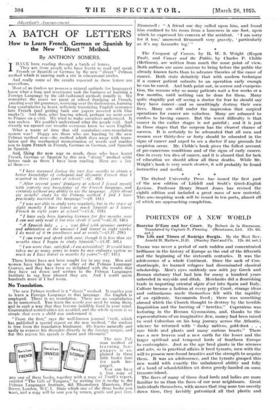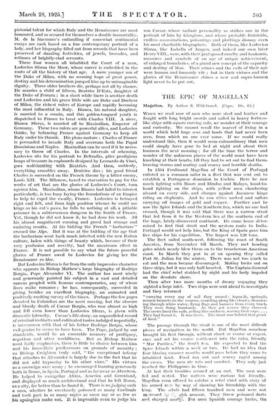PORTENTS OF A NEW WORLD
THERE was never a period of such sudden and concentrated brilliance in the history of Europe as the end of the fifteenth
and the beginning of the sixteenth centuries. It was the adolescence of a whole Continent. Since the sack of Con- stantinople, its learned refugees had disseminated classical
scholarship. Men's eyes suddenly_ saw with joy Greek and Roman statuary that had lain for many a hundred years unheeded in wayside and ditch. Merchants did a flourishing trade in importing oriental objets d'art into Spain and Italy: Culture became a fashion at every petty Court, strange ideas
and enthusiasms made themselves felt with the rapidity of an epidemic. Savonarola lived ; there was something abroad which the Church thought to destroy by the terrible Inquisition and the burning of heretics." Copernicus was lecturing in the Roman Gymnasium, and, thanks to the representations of an imaginative Jew, money had been raised to send Columbus on his long journey across the Atlantic, whence he returned with dusky natives, gold-dust . . .
rare birds and plants and many curious beasts." There was a new heaven and a new earth for the lesser and the larger spiritual and temporal lords of Southern Europe to contemplate. Just as the age bred giants in the sciences and arts, so in practical affairs it bred tyrants, men with the will to possess new-found beauties and the strength to acquire
them. It was an adolescence, and the tyrants grasped this new world with exactly the unbalanced ability and folly
of a band of schoolchildren set down greedy-handed on some treasure-island.
The faces of many of those dead lords and ladies are more familiar to us than the faces of our near neighbours. Great individuals themselves, with names that ring none too sweetly down time, they lavishly patronized all that plastic and
pictorial talent for which Italy and the Renaissance are most honoured, and so secured for themselves a double immortality. M. de in Sizeranne's enthralling if somewhat sentimental essays are each based on a fine contemporary portrait of a lady, and her biography filled out from records that have been preserved of dazzling festivities, of jewels, brocades, and retinues of brightly-clad servants.
These four women all inhabited the Court of a man, Lodovico Sforza the Moor, whose career is embedded in the roots of all the history of that age. A mere younger son of the Duke of Milan, with no seeming hope of great power, destiny and his determination jumped him up to unimaginable dignity. Three older brothers die, perhaps not all by chance. He marries a child of fifteen, Beatrice D'Este, daughter of the Duke of Ferrara ; in a short while there is another death and Lodovico and his grave little wife are Duke and Duchess of Milan, the richest rulers of Europe and rapidly becoming the most influential in Italy. Bianca, his natural daughter, is married to a cousin, and this golden-tongued youth is dispatched to France to treat with Charles VIII. A niece, Bianca Sforza, is married off to Maximilian, Emperor of Germany. These two rulers are powerful allies, and Lodovico thinks, by balancing France against Germany to keep all Italy under his thumb. His plans mature : Charles of France is persuaded to invade Italy and overruns both the Papal Dominions and Naples. Maximilian can be used if it be neces- sary to throw off Charles. In the intervals of scheming, Lodovieo sits for his portrait to Beltraffio, piles prodigious heaps of treasure in cupboards designed by Leonardo da Vinci, goes wolf-hunting with Beatrice. And then, suddenly, everything crumbles away. Beatrice dies ; his good friend Charles is succeeded on the French throne by a bitter enemy, Louis XII. The Milanese, taxed to starvation to pay for the works of art that are the glories of Lodovico's Court, turn against him. Maximilian, whom Bianca had failed to interest particularly, is too busy laying the foundations of an Empire to help to expel the ex-ally, France. Lodovico is betrayed right and left, and from high position whence he could use kings as his cat's paws, he falls to nothing at all, a pitiable prisoner in a subterranean dungeon in the South of France. Yet, though he did not know it, he had done his work. All his almost magnificent cunning and greed had strange and enduring results. At his bidding the French " barbarians " crossed the Alps. But it was at the bidding of the age that the barbarians went back much infected with the new Italian culture, laden with things of beauty which, because of their very profusion and novelty, had the maximum effect in France. It is not possible to say what the future peaceful glories of France owed to Lodovico for giving her the Renaissance en bloc.
But Lodovico Sforza is far from the only impressive character who appears in Bishop Mathew's large biography of Rodrigo Borgia, Pope Alexander VI. The author has most wisely and generously painted his subject in a vast and detailed canvas peopled with famous contemporaries, any of whose lives make romance ; he has, consequently, succeeded in giving besides an excellent biography, an animated and positively exciting survey of the times. Perhaps the few pages devoted to Columbus are the most moving, but the obscure and bloody death of Caesar Borgia, who rose almost as high and fell even lower than Lodovico Sforza, is given with dramatic intensity. Caesar's life-story, an unparalleled record of criminal instincts and cultivated tastes indulged impartially, is interwoven with that of his father Rodrigo Borgia, whose evil genius he seems to have been. The Pope, judged by our standards, would be an execrable memory of profligacy, nepotism and utter worldliness. But as Bishop Mathew most fairly emphasises, there is little to choose between him and his immediate predecessors on grounds of morality ; as Bishop Creighton truly said, " the exceptional infamy that attaches to Alexander is largely due to the fact that he did not add hypocrisy .to his other vices." His virtues as a sovereign were many ; he encouraged learning generously both in Rome, in Spain, Portugal and as far away as Aberdeen. He helped to evangelize Africa, America and Greenland, and displayed so much architectural zeal that he left Rome, as a city, far better than he found it. There is no judging such a man, whether he covetously poisoned as many Cardinals and took part in as many orgies as some say or as few as his apologists make out. It is impossible even to judge his son Caesar, whose radiant personality so strikes one in the portrait of him by Giorgione, and whose probable fratricide, endless assassinations, poisonings and plottings dismay even his most charitable biographers. Both of them, like Lodovico Sforza, like Isabella of Aragon, and indeed our. own later Henry VIII., were, with their juxtaposed cruelty and bonhomie, measures and symbols of an age of unique achievement, of enlarged boundaries, of a grand new concept of the capacity and destiny of Man. Their crimes and the evils of their age were human and humanly vile ; but in their virtues and the glories of the Renaissance shines a new and supra-human light never to be put out.















































 Previous page
Previous page